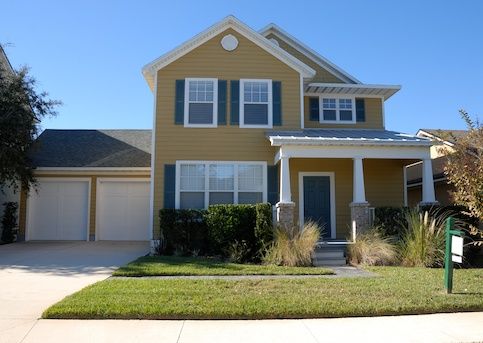When Is The Best Time To Sell A House?

If you’re thinking of selling your home, you may be wondering about the best time to sell. While every real estate market is different and every seller situation is unique, there are certain times of the year when it may be more advantageous to list your home for sale.
And understanding the best times to sell your house may help you get the best possible price.
What Is The Best Time Of Year To Sell A House?
While housing market predictions change each year, the residential real estate market usually follows a seasonal cycle. Spring and summer are traditionally the best time of year to sell. And fall and winter are the worst, especially in the Northeast and Midwest regions where winters are colder and harsher.
Selling A House In The Spring
Spring is widely considered the start of the home buying season and the best time to sell. Demand is high during the spring for several reasons:
- Planning for summer: For families with school-age children, summer is an ideal time to move. Their children’s school year is uninterrupted, and they have time to prepare to start at a new school in the fall. Families typically want to move into a new home by early summer in anticipation of the new school year, so they need to find a house in the spring.
- Pleasant weather: Mild spring weather makes it an ideal time to attend open houses. And sellers can harness the power of Mother Nature to show off their homes at their best. Blooming trees and flowers can help enhance a home’s curb appeal with minimal effort and cost.
- Tax refunds: Home buyers who received a refund from the IRS may have extra money burning a hole in their pockets.
As a home seller, springtime can mean a bigger pool of prospective home buyers interested in your home, especially if it’s a seller’s market. Intense buyer interest can lead to bidding wars – which may boost your selling price.
On the other hand, if homeowners are selling at the same time, home buyers will have more options available to them, especially in a buyer’s market, and competition for your home may not be as fierce.
Selling A House In The Summer
As spring turns into summer, you’ll continue to find home buyers interested in your home, and you can take advantage of long summer days to hold open houses and showings. Even if the hottest properties are already off the market, buyers can find homes for sale during the summer.
If a home has been sitting on the market since springtime, it may be a sign that it’s overpriced or has other issues that make it less attractive to potential home buyers. A home seller may need to adjust pricing or invest in home improvements to stay competitive.
As temperatures soar, make sure your air conditioner is in good working condition and prepare for potentially high air conditioning bills if you want to host many open houses.
Selling A House In The Fall
As the temperature outside drops, so does activity in the housing market. If you plan to sell in the fall, there will be fewer homes to compete with – but there will likely be less buyer demand. If you live in an area where fall foliage is charming, you may get a natural boost in your home’s curb appeal, but you may need to lower your asking price to attract potential buyers.
Selling A House In The Winter
By the time winter rolls around, the housing market has usually chilled significantly. Buyers are less inclined to leave the comfort (and warmth) of their homes to attend showings or open houses. And given the time of year, many home buyers may be prioritizing spending on holiday travel, gifts and celebrations.
Winter can bring challenges to home sellers, like diminished curb appeal. The season may also highlight problems you’d rather not have home buyers focus on, like issues caused by frozen pipes or insufficient heating. Home buyers are more likely to notice these defects if they visit during the winter.
In warmer climates in the South and Southwest, home sales start to spike in January and February. The surge in demand may be due to the growing number of retirees looking for a winter home. And it may also be a sign that home buyers are looking to take advantage of lower mortgage rates during the winter.
See What You Qualify For
Home Purchase
Home Refinance
Tap Into Equity
What Is The Best And Worst Time To Sell?
While seasons play a significant role in the real estate market, certain months are particularly good times to sell – and particularly bad times to sell.
Best Months: March And April
Spring is the best season to sell a house, and past trends show March and April are the busiest months for home sales. Those months represent the start of the season. And it’s also the time of year when home buyers with tax refunds have a little more disposable income to put toward a home purchase.
Worst Months: October And November
The month of October historically marks the end of the home buying season. If your home hasn’t sold by October, it may be a sign you need to revisit your asking price or consider any issues inside or outside the home that may turn buyers off.
Wild Card Months: December And January
You might assume December and January are the worst months to sell, but sometimes these months end up being a good time to sell a home. Winter demand has started growing in recent years, especially as home buyers take advantage of annual bonuses and monetary holiday gifts.
What Is The Best Day Of The Week To List Your Home?
There’s no such thing as a bad day to list your home. But the National Association of REALTORS® recommends listing your home on a Thursday or Friday. A listing that pops up later in the week may gain more visibility just as house hunters are gearing up for weekend open houses. Some experts even recommend timing your listing down to the hour and listing it on the multiple listing service (MLS) around 5 p.m. on Thursday. By doing so, this maximizes the potential of your listing being displayed at the very top, which is where you want to be.
The Bottom Line: Timing Isn’t Everything, Except When It Is
Selling your home isn’t solely dependent on timing. Besides the season, month, day or even time of day that you list, there are other factors to consider, including the real estate market, your financial situation, the condition of your home and your reasons for selling. But if you have any flexibility, putting your home up for sale at the “right” time of year may make a big difference.
See what you can afford.
Quicken Loans® can help you find a lender.










